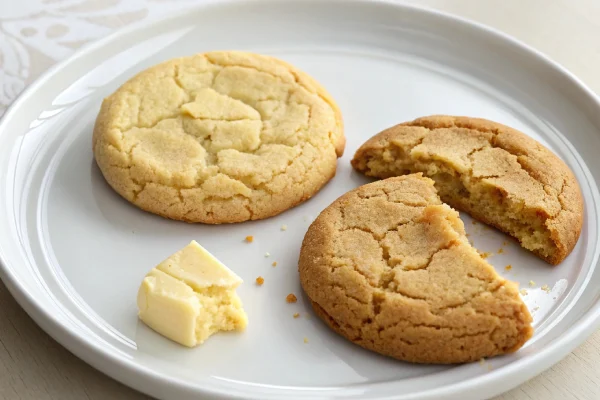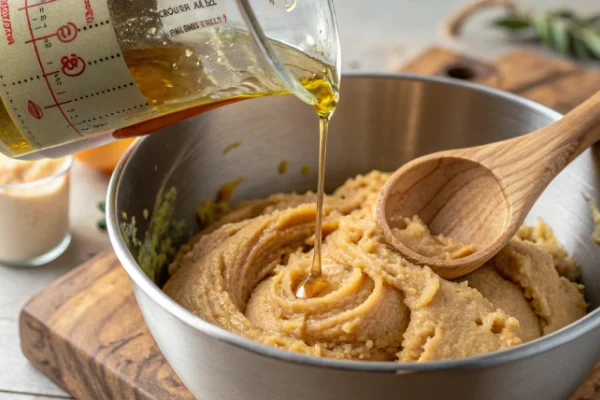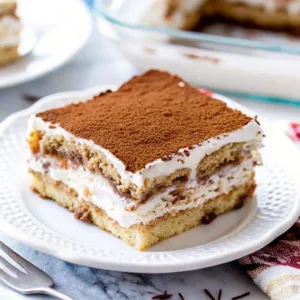Have you ever wondered why certain cookies substitute butter with oil? It may at first appear like a strange choice. After all, butter is associated with rich, delicious flavors in baked goods. But why do you put oil instead of butter in cookies? Oil brings its advantages that can elevate the quality of your cookies to a new level. From keeping them moist to making them more cost-effective, oil is more adaptable than you might think. Let’s explore why you might choose oil over butter and how it could transform your baking.
Table Of Contents
Table of Contents
The Role of Fats in Baking Cookies
Why Fats Matter in Cookie Texture
To comprehend why oil performs perfectly in cookie dough, you need to understand the role that fats play in baking. Fats are tenderizers, providing the perfect balance of crispness and chewiness. They cover the flour particles and prevent excessive gluten from forming. If there aren’t adequate fat levels, cookies could become tough to eat. Nobody would want that, surely?
Key Differences Between Butter and Oil
Oil and butter are both fats, but they share distinct characteristics. Butter is made up of around 20% fat and 80 percent water, which gives some puffiness and crispness to baked products. However, oil is a complete fat, which makes it more effective at securing moisture and providing a smooth and chewy texture. Furthermore, butter is a food with distinct flavors, whereas oil is neutral and allows different ingredients to be in the center on the stage.
Advantages of Using Oil in Cookies
Improved Moisture Retention
One of the most significant benefits of baking with oil is the ability to hold moisture. In contrast to butter, which dries in baking because of its water content, the oil stays in place. This means that cookies are soft, chewy, and sticky throughout the day. This is an ideal option for those who bake ahead of time or prefer cookies on the soft chewy side.
Longer Shelf Life
If you’ve ever cooked cookies with butter, then you’ve likely noticed that they fade in freshness after a few days. Oil-based cookies are more durable and last longer. Water is not present, which means less staining, making oil the ideal choice for cookies to keep or give away.
Neutral Flavor for Customization
Although butter is a distinctive flavor that is perfect for numerous recipes, it may sometimes be a distraction from other ingredients. Oil, since it is neutral, lets flavors such as vanilla, chocolate, or even spice shine. If you are a fan of experimenting with different cookies, oil is the perfect blank space for your creativity. For instance, the use of oil instead of butter can enhance recipes such as three-ingredient Peanut Butter Blossoms: a Quick and Simple Recipe by making sure the peanut butter taste truly shines through.
Comparing Butter and Oil in Cookie Recipes

Flavor Impact
The taste is among the main distinctions between cookies made using butter and those that are made using oil. Butter gives the flavor of a creamy, richness that is often associated with traditional baked items. Oil, however, isn’t a major contributor to flavor, which could be both a plus and a drawback. If your recipe heavily relies upon the taste of fat, butter could be the best choice. For recipes that focus on other elements, using oil can help to make those flavors make an appearance.
Texture Variations
In terms of texture, the distinction is awe-inspiring. Butter-based cookies tend to be more crisp at the edges and more soft at the center. They also exhibit a slight flakiness because of the amount of water in the butter. On the other hand, oil-based cookies are tender and enjoyable. This makes oil a great option for recipes that value the texture over the crispness.
Health Considerations
The bakers who are mindful of their health often choose oil due to its fat content that is unsaturated which is believed to be healthier for heart health than butter’s saturated fats. Furthermore, oil is cholesterol-free, which makes it an excellent choice for those who monitor cholesterol levels.
When to Use Oil Instead of Butter in Cookies
Dietary Preferences
Oil is a game changer for bakers who cater to specific particular dietary requirements. For instance, if you’re making cookies for a person who’s lactose intolerant or vegan, then oil can be an excellent alternative to butter. Utilizing plant-based oils you can make cookies that are suitable for everyone to appreciate.
Budget-Friendly Baking
Baking can be expensive, particularly when you’re baking large batches to give away at events or for gifts. Oil is typically less expensive than butter, and it can be stored for longer durations which makes it an economical option for home bakers.
Convenience in Recipes
If you’re in a hurry or just like simplicity oil is extremely convenient. As opposed to butter, which usually requires softening or melting, oil comes readily available out of the bottle. This will save you valuable preparation time, especially if you’re working in a hurry.
How to Substitute Oil for Butter in Cookies

Understanding the Conversion Ratio
Substituting butter for oil isn’t as straightforward as a simple swap, however, it’s not rocket science either. Since oil is only fat, while butter is made up of water, you’ll require slightly less oil to get the same results. A best practice is to use 3 cups of oil for each tablespoon of butter. This little adjustment will help keep your cookies from becoming too oily.
Tips for Maintaining Cookie Consistency
Are you worried that the dough will become too sloppy? Don’t be! You can even balance evenness by adding a bit of extra flour or a second egg. These adjustments will allow your cookies to hold their shape, without sacrificing the softness.
Types of Oil to Use in Baking
Vegetable Oil
Vegetable oil is the preferred option for most cookie recipes. It’s cheap as well as neutral in flavor and easily accessible, making it the perfect choice for baking in the everyday.
Olive Oil
To add a touch of class light olive oil could be an excellent choice. It is a great match for cookies with dried fruits, nuts or even spices. Make sure you make use of lighter or refined olive oil to stay clear of an overwhelming taste.
Coconut Oil
If you’re looking for an exotic flavor coconut oil is the most effective option. It’s solid at temperatures of room temperature, meaning it has the same consistency as butter. In addition, its subtle coconut taste gives a distinctive flavor to your cookie.
Common Mistakes When Using Oil in Cookies
Overmixing the Dough
One of the most frequent mistakes that bakers face when using oils is mixing too much of the dough. Because oil makes the dough more flexible, mixing too much could result in hard, dense cookies. Mix only until the ingredients are incorporated to achieve the most optimal outcomes.
Using Strongly Flavored Oils
All oils are not created to be the same. oils with strong flavors such as extra-virgin olive oil could overpower the delicate flavor of cookies. Choose neutral oils unless the recipe requires something stronger.
Cookies Recipes Using Oil

Classic Chocolate Chip Cookies
Cookies made of chocolate and infused with oil are extremely tender and soft. The neutral taste of oil allows the chocolate to be the star giving every bite an experience that melts in your mouth.
Vegan Oatmeal Raisin Cookies
To give a dairy-free spin to an old-fashioned treat, oil does magic in oatmeal raisin cookies. They remain moist and increase the chewiness. All the while, it is 100 percent plant-based.
Chewy Sugar Cookies
The texture of sugar cookies is all in the details and oil produces perfect soft and soft cookies that won’t break apart.
Conclusion
The choice between butter and oil is based on personal preference and the needs specific to your recipe. While butter has an intense flavor as well as a slightly sharp texture, oil is superior at keeping your cookies soft, moist, and fresh for a longer period. If you’re trying to meet the needs of a particular diet baking on a tight budget, or simply want to experiment with something different oil is a great option to look into. So why not test it to see what you think? The cookie recipe could be a surprise to you!
FAQs
1. What happens when oil alters cookie texture?
Oil makes cookies more soft and chewier than butter, which can create the appearance of a crunchy texture.
2. Can I substitute butter with oil in all recipes for cookies?
Although you can substitute oils with butter in many recipes, small adjustments to the ingredients might be necessary to keep the desired consistency and texture.
3. What kind of oil is best with cookies?
Neutral oils like canola or vegetable oil are great, however, coconut or olive oil can be used to create specific taste profiles.
4. Do cookies that have oil spread more widely than cookies made with butter?
Yes, cookies that are made with oil are likely to be more spread out during baking because of the absence of solid fat.
5. Are cookies that contain oil better for you?
Cookies that contain oil tend to be lower in saturated fats and cholesterol, which makes them a healthy choice.



